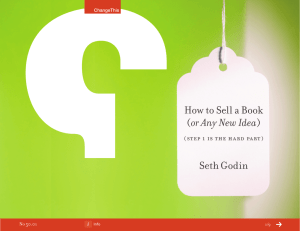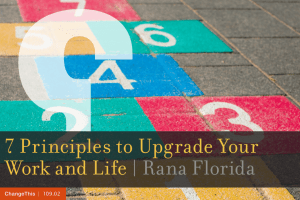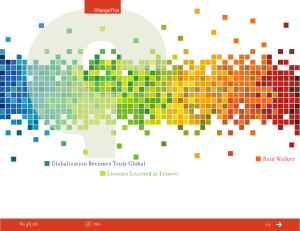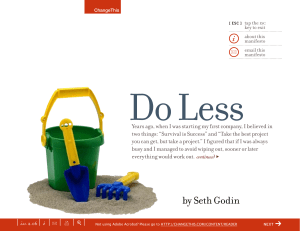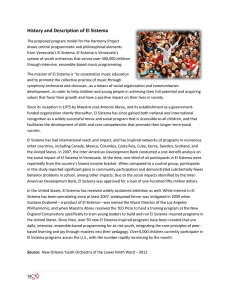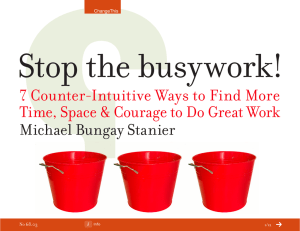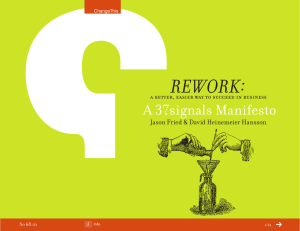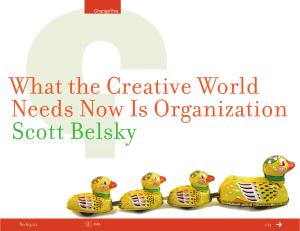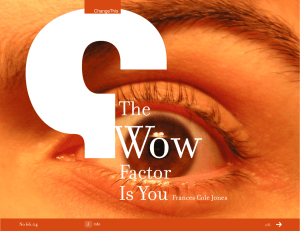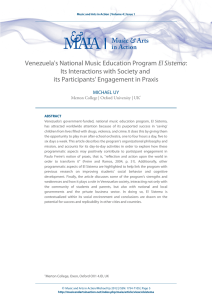El Sistema Comes to the USA
advertisement
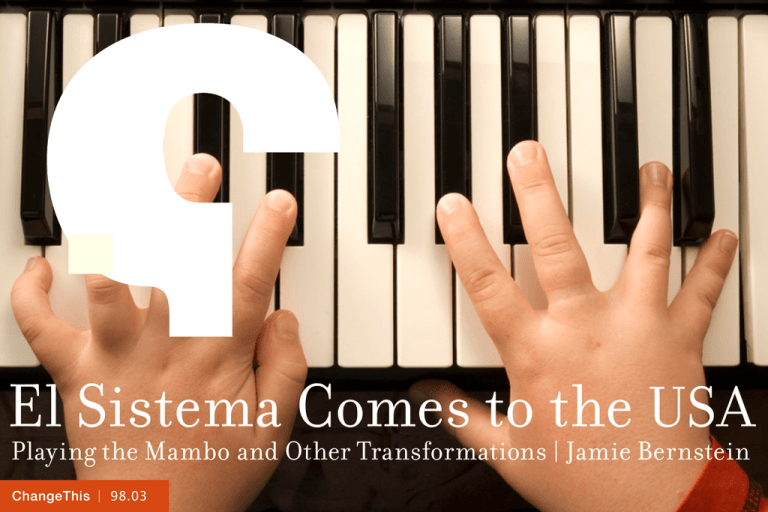
El Sistema Comes to the USA Playing the Mambo and Other Transformations | Jamie Bernstein ChangeThis | 98.03 About 5 years ago, someone on Facebook posted a YouTube video of a youth orchestra playing the Mambo from my father’s musical, West Side Story. It was the encore of their concert, and the crowd was going wild. The young musicians were all cheering too, and wearing satin jackets in the bright colors of the Venezuelan flag. The conductor, who was also very young, had a lot of curly dark hair, and a joyous face. Then he lifted his baton and began the Mambo. The video image I was watching was smaller than my iPhone, but still I could tell I had never heard the Mambo played like that. And believe me, I have heard the Mambo hundreds of times in my life. The energy, the passion—and the superb artistry—that poured out of these kids and their young conductor, Gustavo Dudamel, was bringing me to tears. This was something I had never seen before. No, wait—of course I had seen it before: this was the very same energy and pure joy that poured out of my own father, Leonard Bernstein, when he made music. ChangeThis | 98.03 But—where was my father to witness this amazing performance? He was no longer alive, and I could not bear that he was missing this. This was everything he’d ever meant, right there on my laptop screen. I just had to find out what the story was behind this video. So I decided to be my father’s eyes and ears, and find out for him, as well as for myself, who these young musicians were, and how they came to be such amazing and joyous performers. And what I found out made me wish even more that my father was alive to see it. When I first heard about El Sistema, it sounded much too good to be true. Children from impoverished neighborhoods learning to play orchestral instruments and experiencing a deep transformation in their lives? Hundreds of thousands of them, all over Venezuela? Really?! Well, I would just have to go see for myself. So I went down to Venezuela. The kindest, liveliest people I’d ever met took me to see a few of the El Sistema centers, or nucleos, around the capital city of Caracas. It was not what I expected at all. This was not some rigid, Soviet-style program cranking out virtuosos. There was a considerable element of chaos. The kids were noisy and exuberant. There was a lot of laughter. ChangeThis | 98.03 I saw thousands of kids, many from some of the poorest neighborhoods in the world, hurling themselves into their music. My father, who believed with all his heart in the power of music to transform young lives, would have been thrilled to his core. First I was taken to visit the very young children, who were playing rhythm games and singing songs, often in their mothers’ laps. Then I saw the slightly older children, who were learning to play stringed instruments. By the time I saw the 8 to 10 year olds, I was hearing “The Great Gate of Kiev” from Mussorgsky’s “Pictures at an Exhibition.” And by the time I saw the high school kids, I was hearing Tchaikovsky, Brahms, Shostakovich. These kids could power their way through anything—and they sounded brilliant. And always—always—so much joy. I know it sounds impossible, but El Sistema is for real. “ When I first heard about El Sistema, it sounded much too good to be true. Children from impoverished neighborhoods learning to play orchestral instruments and experiencing a deep transformation in their lives? ... Really?! ChangeThis | 98.03 El Sistema’s founder, the visionary musician and economist Jose Antonio Abreu, has said, “If you put a violin in a child’s hands, that child will never hold a gun.” It is a profound idea: to use an orchestra as a means of personal growth for children in impoverished environments— which in turn brings transformation to the community as a whole. Yes, a very big idea indeed. And now this idea is spreading around the world. Every month, it seems, we hear about another nucleo starting up in another country. It was my great good fortune to be invited back to Caracas a year later to narrate my youth concert about my father’s music, “The Bernstein Beat,” with one of El Sistema’s extraordinary youth orchestras, Orquesta Sinfonica Juvenil de Caracas, conducted by a dynamic young Venezuelan, Dietrich Paredes. Up close, I could see how passionately devoted they were to their playing—yet never at the expense of their essential, irrepressible Latin exuberance. Maestro Dietrich worked the orchestra hard to master the complexities of excerpts from On the Town, Fancy Free and West Side Story. I was so impressed by the teenagers’ focus and good humor. This was not easy music to play, but by the end of the week, they were playing it like champs. The concert went beautifully, with only one glitch—painfully enough, right at the beginning. ChangeThis | 98.03 For some reason the clarinet player, who had never had this trouble before, added one extra note to the series of repeated notes he plays at the opening of the “Times Square” ballet from “Three Dance Episodes from On the Town,” thereby putting himself one disastrous beat behind the rest of the orchestra. Maestro Dietrich stopped the players, waited for the clarinet player to collect himself, and then started the piece over. The same mistake happened again. Maestro Dietrich stopped the orchestra, again. I sat motionlessly on my stool to Maestro Dietrich’s left, trembling in my high heels. The hall was engulfed in a sickening silence. Maestro Dietrich started the music a third time. And the clarinet player did it again. This time the conductor just kept everyone going, and things eventually righted themselves, but it was a tough start for one and all—especially, of course, for the clarinet player, who never raised his head and fled offstage before the final bows. Between those bows, just offstage, Maestro Dietrich was frantically looking for him. “Donde está Antonio? Donde está Antonio?” But he was gone. After the concert, there was a lunch in a hotel dining room for Maestro Dietrich and me, our guests, plus some Sistema officials and members of the youth orchestra. We’d been sitting a few minutes when suddenly the musicians burst into applause: Antonio the clarinet player had walked in. The musicians all jumped up from the table and surrounded him with hugs, back slaps, jokes and words of encouragement. He half-jokingly covered his face in embarrassment, but of course resistance was futile, and he was soon smiling and returning the hugs. ChangeThis | 98.03 I watched all this with my mouth open and my eyes filling with tears. I had never in all my life seen such a magnificent demonstration of support and compassion for a fellow musician. Truly, this was the essence of El Sistema. As one representative from the organization said afterwards: “We don’t build musicians; we build human beings.” You can bet my father would have said amen to that. Leonard Bernstein devoted much of his life to bringing music to young people, as the whole world knew from his historic televised Young People’s Concerts, as well as from the various music festivals he started around the world. My father believed in the power of music to transform young lives. That’s why El Sistema would have been the logical next step for him, if he had only lived long enough to learn about it. By now, it can be said with confidence that El Sistema is one of the most inspiring and promising social movements in the world today. From its beginnings 37 years ago, when Maestro Abreu began teaching 11 kids in a parking garage in Caracas to play stringed instruments, El Sistema has grown to serve over 400,000 young participants in Venezuela alone —and now it’s going global. The neighborhood centers, or nucleos, where children gather daily after school for their total-immersion musical experience, are sprouting around the world—from Korea to Scotland to Bolivia to Japan—and, as of the ChangeThis | 98.03 last few years, in the United States. Three years ago there were a mere handful of Sistemainspired sites around the nation; today, there are over 60 and counting. Meanwhile, El Sistema graduates are beginning to show up in world-class orchestras such as the Berlin Philharmonic, while in Los Angeles, conducting superstar Gustavo Dudamel, El Sistema’s most illustrious alumnus, is Music Director of the Los Angeles Philharmonic. As we mentioned above, Maestro Abreu said of the power of music to lift an oppressed soul, transform a distracted mind, and rescue a damaged life. “A child who holds a violin is not going to pick up a gun.” El Sistema has demonstrated that the experience of playing in an orchestra of one’s peers will transform a child’s life, no matter what nature of work they take on as adults. In September 2010, Stanford Thompson, a dynamic 24-year-old African American trumpet player from Georgia, founded a nucleo in a tough neighborhood in West Philadelphia, running it out of the St. Francis de Sales School at the end of each school day. In less than a year, around 80 kids went from never having held an orchestral instrument in their hands to performing Beethoven’s “Ode to Joy” for a packed auditorium full of astonished family and friends. This fall, the Play On Philly! program will add two new sites and hundreds more kids. Stanford is well on his way to building his dream of “orchestras everywhere.” ChangeThis | 98.03 “ In less than a year, around 80 kids went from never having held an orchestral instrument in their hands to performing Beethoven’s “Ode to Joy” for a packed auditorium full of astonished family and friends. On the very first day of the program two years ago, my co-producer Elizabeth Kling and I were there with our cameras to begin our in-depth documentary about the kids, the teachers and the West Philly community as they are touched by the Play On Philly! program. In the process of our filming, we soon grasped that there was so much more going on for the Play On Philly! kids than just learning to play music.1 Something else was happening simultaneously, which the kids themselves were probably not even realizing. They were learning invaluable lessons about empathy, patience, focus, and personal worth. 1. We begin year three of filming this September. You can watch a brief work-in-progress trailer about our film on and support our online fundraiser here: http://www.kickstarter.com/projects/476915875/el-sistema-usa-documentary or our site here: www.elsistemausafilm.com. ChangeThis | 98.03 This is the kernel of Maestro Abreu’s idea for El Sistema: to use a symphony orchestra as a template for a society that works. In the process, they acquire essential resources that will enormously expand their options and expectations later on: such elements as self-confidence, dedication, patience, empathy, a sense of belonging and a sense of working for the good of the group. For an at-risk child in an impoverished community, the acquisition of such traits can make all the difference in their life, in the lives of their families and, eventually, in the life of the community as a whole. As filmmakers, we intend to show this process unfolding. We can’t predict the outcome, but we’re certain that everyone involved with Play On Philly! will have an unforgettable journey. In fact, they’re having one already. ChangeThis | 98.03 Info About the Author | Jamie Bernstein is a narrator, writer and broadcaster who has transformed a lifetime of loving music into a career of sharing her knowledge and excitement with others. Her father, composer-conductor Leonard Bernstein, together with her mother, the pianist and actress Felicia Montealegre, created a spontaneous, ebullient household bursting with music, theatre and literature that turned Jamie into a lifelong cultural enthusiast. Jamie now travels the world as a concert narrator, appearing everywhere from Beijing to Caracas to Vancouver. In her role as a broadcaster, Jamie has produced and hosted numerous shows for radio stations in the United States as well as for BBC Radio 3 in Great Britain. In addition to hosting several seasons of the New York Philharmonic’s live national radio broadcasts, Jamie has presented various series for New York’s classical station, 96.3 WQXR FM. Jamie also writes articles and poetry, which have appeared in such publications as Symphony, DoubleTake, Town & Country, and Gourmet. ➔ Send this | Pass along a copy of this manifesto to others. ➔ Subscribe | Sign up for e-news to learn when our latest manifestos are available. This document was created on September 12, 2012 and is based on the best information available at that time. The copyright of this work belongs to the author, who is solely responsible for the content. This work is licensed under the Creative Commons Attribution-NonCommercial-NoDerivs License. To view a copy of this license, visit Creative Commons or send a letter to Creative Commons, 559 Nathan Abbott Way, Stanford, California 94305, USA. Cover image from Veer. You are given the unlimited right to print this manifesto and to distribute it electronically (via email, your website, or any other means). You can print out pages and put them in your favorite coffee shop’s windows or your doctor’s waiting room. You can transcribe the author’s words onto the sidewalk, or you can hand out copies to everyone you meet. You may not alter this manifesto in any way, though, and you may not charge for it. ChangeThis | 98.03 About ChangeThis ChangeThis is a vehicle, not a publisher. We make it easy for big ideas to spread. While the authors we work with are responsible for their own work, they don’t necessarily agree with everything available in ChangeThis format. But you knew that already. ChangeThis is supported by the love and tender care of 800-CEO-READ. Visit us at 800-CEO-READ or at our daily blog. Explore your knowledge further with KnowledgeBlocks, a new project from 800-CEO-READ that lets you turn what you know into knowledge you can use. ChangeThis | 98.03

